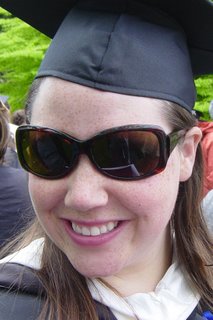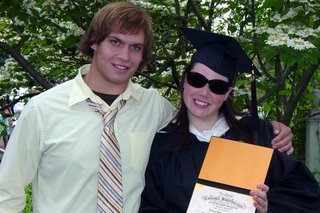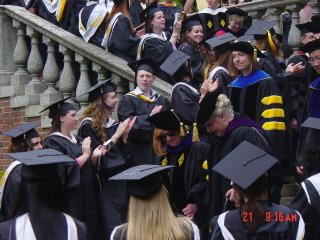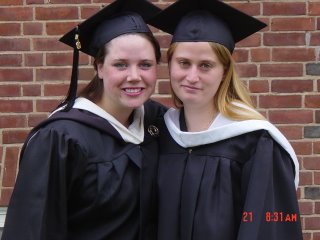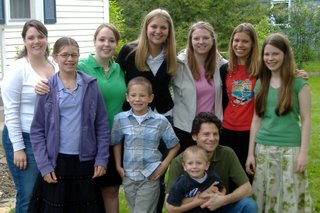Sunday, May 28, 2006
Some Picks from Senior Week/Ivy Day
 "Now: I STILL take Off Mountain Day." ~ Smith Class of 1981
"Now: I STILL take Off Mountain Day." ~ Smith Class of 1981 Frances, April (my roommate soph & senior years) & Me waiting for the Ivy Day Parade
Frances, April (my roommate soph & senior years) & Me waiting for the Ivy Day Parade Rosie & Alex on Chapin Lawn... a bit of the Pippy Longstocking, non?
Rosie & Alex on Chapin Lawn... a bit of the Pippy Longstocking, non? Follow the Yellowbrick Road... Rosie walks this way!!!!!
Follow the Yellowbrick Road... Rosie walks this way!!!!! Lizzie & I are a bit cozy at Tunnel Bar
Lizzie & I are a bit cozy at Tunnel Bar Rosie, Hayden & Me in Lizzie's Room... we're not locked inside this time... notice the smiles.
Rosie, Hayden & Me in Lizzie's Room... we're not locked inside this time... notice the smiles.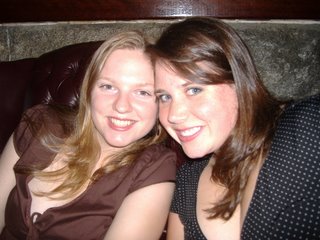 Rosie & Myself at Tunnel Bar
Rosie & Myself at Tunnel Bar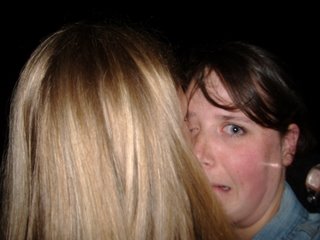 Lizzie is having her way with me... hmmmm....
Lizzie is having her way with me... hmmmm....
Monday, March 06, 2006
Timeout for the Oscars
Okay, I was going to finish up my WCC commentary by posting highlight photos from the event, but I think there should be a timeout for the Oscars.
My thoughts are as follows:
A) Jon Stewart = fabo
B) Only award with which I violently disagreed was the Best Original Song... I just cannot agree that the pimp song could EVER beat out Dolly... I am sorry.
C) George C was fantastic in Syriana... two thumbs way up... tho Jake G was all kinds of dreamy in Brokeback. Sorta think that George got the pitty Oscar, since he wasnt going to get Best Director.
D) Speaking of Jake, can we discuss how dreamy he was in his classic tux?
E) Best Original Score could have gone to any one of the nominees; but the Brokeback theme broke my heart every time I heard it in the film, so excellent job with that one.
F) Philip Seymour Hoffman is beyond amazing. Sooooo glad he won, tho I haven't seen Capote. He's incredible in EVERYTHING he does. I have no doubt this performance was worthy of the little gold man.
G) Reese!!!!! Oh how I adore Reese! I am sooooooooo very pleased that she took home the Best Actress award. I thought about Walk the Line for over a week after seeing the film. I wanted to fall in love with a disfunctional musician after seeing Johnny & June's lovestory on the screen. Resse was phenominal as June Carter... and she's a girl from Tennessee.
H) Crash... excellent movie... well, the second half is incredible (the only part I've seen, tho I expect Quinn will change that when he visits this weekend. He's been after me to see Crash for ages). Glad it took home Best Film, tho all of them were fantastic this year.
I) Jen A looked absolutely stunning
J) I heart Ben Stiller
K) I LOVE Wallace & Gromit... beyond excited that they took home the Best Animated Feature.
and I've decided to stop with "L"... tho I could continue:
L) I was deeply disappointed that they had Heath sitting on the front row... not because I have any beef with Heath, in fact, I find him absolutely, gorgeously beautiful... HOWEVER Michelle W is another case entirely. Michelle W makes me violently angry. I do not know why, or when it began, but it is there and pure. All they did was show her in that ugly orange dress, sitting next to her way-too-cute-for-her-man, smiling away as if she were part of the Hollywood elite... and a piece of my soul died each time. Shut up, she's from Dawson's Creek (a show that I admittingly loved)...
And those are my thoughts on the Oscars
Thursday, February 23, 2006
an affair with the orthodox
I have had a very interesting reaction to the Orthodox here at the assembly. I will admit that I am guilty of an uneducated assumption, expecting the Orthodox to be conservative and ridged participants in the WCC. However, it quickly became apparent that I was totally incorrect. Many of the Orthodox I have incountered have been overwhelmingly progressive on issues of justice, human rights, and peace. They are active participants in the ecumenical movement and are dedicated to Church unity. I have much respect.
As I mentioned before, I find myself oddly drawn to the Orthodox (religiously... it has nothing to do with the amazing Romanian Orthodox priest with whom I danced the other night). I am attracted to the ceremonial aspect of their faith traditions. I recognize several similarities between the Orthodox and Disciples of Christ. WE are both New Testament churches, who search for our Christian identity and guide for activity in the New Testament Scripture. Also, both communions assert the importance of Eucharist within any worship experience. the WCC refers to our morning and evening gatherings as "prayers." In the Orthodox tradition, Eucharist the the neccessary component of "worship." Disipcles founder Alexander Campbell articulated our worship experience: with the breakin gof bread, Christ is crucified, and through worship he is ressurected. In the DOC tradition, Christ is risen again each time we worship together.
That all being said, I am deeply affected by the continuing seperation at Christ's table. We share two very important views of our faith: yet, we cannot share in communion. It is in Christ that we are united with God and with each other; but, how can we truly find that unification if we caannot meet at the table of Christ? My heart pains at this current reality. We must be able to share in the body of Christ if we are to ever be the active body of Christ engaged in the world. It is my hope that one day we can be.
God in your grace, transform our hearts, and thus transform the world.
Thanks Be To God
We finally broke bread... we broke bread together. It was worshipp, truly worship, and my emotions over finally overtook me.
I had been fighting off tears all day; they have been threatening to ovecome me since I woke up yesterday morning. The realization of this whole experience has finally set in, just as it is coming to a close. I am not quire sure where to go from here. When I wake up on Sunday, I will not hear the languages, I will not see the faces, I will not have the world surrouding me.
Talk about seperation... I will be broken in a way that I did not know was possible. But I am also leaving this experience a little bit more whole than when I arrived.
I will take back with me the realitionship I have fostered, the sotries I have heard, and the experiences I have shared.
We broke bread, we blessed it, we shared it together, and it was beautiful.
In our brokenness, we are made whole.
Wednesday, February 22, 2006
On the Archbishop's Remarks
I was completely taken by Archbishop Rowan Williams. He spoke as the keynote presenter during the plenary on religious pluralism. He began by constructing a basic Christian identity form which to view the world. As a faith community – who carry the name of Christ – we show, through our lives, the testimony of God’s promise to the world. Our Christian identity provides us a context to discover who we are. WE bear Christ’s name, not to look back at the founder, but rather to look for Christ in the world today. Even more so, we are to be Christ, intimately engaged with God and the entirety of God’s creation.
Archbishop Williams called for bold, prophetic words to come from our lips; for, it is we who bear witness to the Messiah’s continued presence in the world. We are servants to Christ, and we are also Christ. Christ is, therefore, seen in us and through us.
Archbishop Williams said it is not our job to claim an absolute truth to salvation. Instead, by being in our particular place, we are able to be in relationship with God without fear. We can be at peace with ourselves, and in peace with the world. We are able to transform our most deeply hated fears into love. The family of Christ does not hold a map of boundaries or an exclusive key to unlock the Truth. We do, however, exist to share what we see, to live out God’s gift in Christ.
The Christian identity is more than a faith identity, it is a life identity. However, Archbishop Williams clearly asserted the importance of remaining in relationship with those of other faith identities. Our inter-religious brothers and sisters are not in error, while they leave out the most important part of the human experience – Christ. Yet, through the lenses of other faiths, they may be able to bring new light to our own corners of darkness. Those of other religious backgrounds have different perspectives, which are crucially significant to understanding God’s world.
As a part of our calling to faithfulness in Christ, Archbishop Williams stressed the necessity of staying with the “other”. In their faith language, we can see reflections of our own. Our calling to be the engaged Christ alongside our neighbors is at the very core of who we are as Christians.
While the barriers of faith language may at times be problematic and painful to overcome, we must take our relationship beyond seemingly unsurpassable obstacles. We must live our commitment to active faithfulness and go to the place where Christ is to be engaged with God in the world.
Monday, February 20, 2006
An Ecumenical Conversation
“As I was walking once in Jerusalem, I came upon a woman with her church group from the United States visiting the Holy Land. I asked her where she had visited, and she gave me the usual list of places. Then I asked her if she had spoken with any Palestinian Christians, and she was quick to reply: ‘No, no, this is a church group. We’re not getting political.’” Bishop Dr. Munib Younan, Head of the Evangelical Lutheran Church in Jordan and the Holy Land, recounted his experience to a room of approximately 60 people. The World Council of Churches Ecumenical Conversation titled Public Life, Religion and Politics: Ambiguities and Possibilities met to discuss the roles of religion and politics. Our decisions – if any were made – would be passed along to the WCC General Assembly the following week.
I was one of four “youth” participating in the conversation; three of us were the only representatives from the United States. The room was filled with individuals from all regions of the world, although the majority of participants were from Europe and the Middle East. During the three day conversation, we listened to presentations, shared stories, and tried to reach a consensus on the broad – yet crucial – question: what is the role of religion in contemporary world politics?
Throughout the Christian story, politics have been connected with religion: Moses challenged Pharaoh; David was king; Paul was imprisoned by political authorities; and Jesus, the Christ, was executed by the Empire. Bishop Younan argued that were Jesus to be told, today, to stay out of politics, he “wouldn’t really understand.” Yet, as a result of the secular, democratic state, religion has been constitutionally privatized.
Dr. Konrad Raiser, former General Secretary of the WCC, argued that “politics” is much more than the action of state and power authorities; it is, rather, a wider concern for “serving the public interest and the common good.” If his claim is in fact true, politics is interconnected with religion at their very cores and cannot be separated.
Many shared stories where politics and culture had been widely impacted by religion – the former Soviet Union, the United States, and the Middle East, to name a few locations. “Nowhere in the world is the mix of politics and religion as potentially lethal as in the Middle East, as recent events have painfully shown us,” Bishop Younan said. For when the emotionality of religion enters a conflict, it is exponentially more difficult to find resolution.
The Ecumenical Conversation was also concerned with the use – or misuse – of religion to legitimize actions which obviously break the social moral code. Terrorism, war, and oppression violate the accepted ethical guidelines within which society lives. The conversation agreed that to avoid such occurrences, religious communities must – in the words of Dr. Raiser – “begin to mark out together the basic criteria for assessing the moral and ethical legitimacy of political actions and the use of political power.”
As Jesus quoted the prophet Isaiah: “The Spirit of the Lord is upon me, because he has anointed me to bring good news to the poor… to let the oppressed go free” (Luke 4: 18), so must the Church be actively engaged in the common good. Those in the Ecumenical Conversation agreed that the Church is obligated to uphold justice and reconciliation, yet there were differing ideas on how to do so. Several European delegates offered a proposal to set guidelines for inter-religious dialogue; while Dr. Marc Luyckx, a presenter from the Roman Catholic Church, suggested that an era of global tolerance for diversity is already here, and we simply have to wait for its peak.
The youth drafted a statement which urged all member churches to: “follow in the tradition in which the WCC was founded and join with outside organizations, institutions, and peoples who are working toward the same goals of peace, justice, and human rights. We can achieve more together than alone. It is our calling from God to be the hands with which Christ is active in the world.”
While no consensus statement was sent to the General Assembly, the three days of dialogue were fruitful. We began to unravel the complex relationship between religion and politics in the contemporary world. The woman to whom Bishop Younan spoke believed Church and politics could not mix, but I left the Ecumenical Conversation with a different opinion. The world ecumenical movement is already working for a common, public good. We are answering our biblical calling to be the prophetic voice and active hands of Christ, striving for a peaceful, just and whole world.
Thursday, February 16, 2006
???
I typed up an entry last nite, but did not finalize the publishing... sorry. you get two tonite. i am sorry that there has not yet been a posting on the WCC general assembly. i will make this brief, but will compose a stronger and more interesting entry for later in the day.
I will share a story:
I was sitting next to a man from Cameroon on the bus to the hotel last nite. I decided to attempt a conversation in french... the thing is, i understand the lanuag, but cannot speak it. A woman came and spoke about ecumenical envolvement including passion, humility and humiliation. i definitely got the humiliation bit down that day. I could only speak the most basic sentences and found myself completely reliant on my mother~s translation. i made a fool of myslef, but still made a connection with a man from a culture completely different than my own. i appreciated everything. the conversation was interesting, and it taught me an important lesson: humiliation comes with eccumanism, but it is well worth everthing,
Also, i must say that it is completely refreshing to attend an assembly and know that my opinion/interpretation of the Biblical texts are not totally off base... even our Orthodox brothers and sisters -- about whom I was not certain of their general political leanings -- are in favor of social and political activism for peace and justice in the world. it is wonderful to no longer be in the minority, in our large body, we will seek to transform the world.
i apologize that it is not longer, but i will do my best to set something up later in the day.
cheers,
b
Wednesday, February 15, 2006
Two Days at the 9th WCC General Assembly
Its really difficult to know where to start with this. I will apologize for not having posted earlier... long story with the travels, and its been pretty much non-stop since I've arrived.
Yesterday was orientation. We learned most of the ropes and discovered all that is available to the non-delegate participants (thats me). There are actually many many opportunites for workshops. There is a very rich list from which to choose. We also had our first community worship, called "Prayers." I was told that the name "prayers" is a concession made for the Orthodox communities. It was too long, but also not long enough. Can you imagine worshiping with 3800 Christians from over 300 communions and the seven populated regions of the world? It is an incredible experience. I will in no way do the experience justice, so I'll type out the two major geographically-oriented sections of the service.
GIFTS OF GRACE: Recieving the Gifts from the Regions (for the Table)
Gathered here as people from all the regions of the world we are thankful for the gifts of
Africa - represented in the symbol of a stone from Turkana which is the cradle of Humanity;
Asia - represented int he symbol of a bell;
Caribbean - represented in the symbol of sugar cane;
Europe - represented in the symbol of a reindeer calf skin;
Latin America - represented in the symbol of fruits and a Salvadorian cross;
Middle East - represented in the symbol of a Coptic icon "the Entry of the Lord to Egypt" ;
North America - represented in the symbol of grains of corn and wheat as well as a symbol of the First Nations;
Pacific - represneted in the symbol of "le Toga" (woven mat) from Samoa/Polynesia, a "Stick Chart" (map constructed with sticks of the ocean's currents) from the Marshall Islands/ Micronesia and "Tanoa" (traditional ceremonial bowl) from Fiji/Melanesia
Litany of Cries fro Transformation (abridged)
Voice One: O god of the East, the West, the Northa and the South, your love has conceived your creation, your Word has brought it into being and your Spirit has endowed it with your life. In the promise of your transforming grace we beseech you Lord, hear us and have mercy.
From Afria - We have come from the birth place of humanity, a land of rich cultural and spiritual heritage. We have come, a people divided artificially into many nationalities, a people torn apart by wars, greed and lust for power, a people whose very existence is today threatened by a plague without cure. We have come, a people not broken by centuries of exploitation, opression, enslavement, poverty, disease and misrule, but heald up by the great resilience, strength of spirit and mutual love with which you have so richly endowed us. We come, daring to trust in your transforming grace. We cry to you in faith: O that we may see our groaning transformed into joy, our contempt into the promise of your life. O God of love, hear us, we pray:
From Asia - We come from the home of ancient and enlightened civilizations and the habitaiton of half of humanity. We come from homeless children crying and begging on the streets of Colombo, Manila and Jakarta. We pray for the hundreds of child sex workers in the brothels in Cambodia, for the million or so internally displaced people in Sri Lanka and Myanmar...We cry for the tsunami and earthqake victims of the South and Southeast Asia...We cry for the vicitms of the long-standing division and rift in the Korean Peninsula and other tensions in Asia... We dare to hope and pray that those who struggle for dignity, justice and peace will harvest the fruits of your transforming grace! O righteous Lord, hear us, we pray:
From the Caribbean - We come from a land of natural beauty and serenity. We come bringing out cultural and religious diversity. We come with our frustrations and with our problems of pollution resulting from an exploitative tourism industry. We bring the cries of the victims of the trafficking and consumption of dreugs, of domestice violence and HIV/AIDS. Both our young and our old suffer the consequences of unemployment, corruption and migrations; but also we come with our dignity and hope in the God of Life, which strengthens our struggle for transformation. It is in that hope that we fervently pray to you, O all-gracious Lord, her us, we pray:
From Europe - We come from lands of great diversity and of many contadicitons. We come aware of our rich heritage of civilizations, culture, knowledge and spirituality - a tradition of life: liberty, democracy and human advancement; but also are fully aware that we carry a tradition of death: wars, conqests, exploitation, racism and genocide. Today as Europe struggles to be a better place for all people we come before you with the cry of those who are left behind by the increasing gap between rich and poor... we fervently pray: O All-faithful God, hear us, we pray:
From Latin America - We come from lands full of life and hope. We cry out for homes to call our own, shelter, food, health and respect for the rights of teh many children who lack them. We cry out for respect for the right to attend school and play during childhood... We cry out for an end of all forms of violence. violence which... is a response to foreign political and economic interests which pay no regard to our peoples' pain, suffering and rights... We cry out for independece to take our own decisions as peoples. We cry out for work for all, with fair wages and equal opportunities. WE cry out for life in abundance for all our people! O merciful God, hear us, we pray:
From the Middle East - We come form the humble land that bore the Christ, Jesus our Lord, prince of peace... We come bearing gifts of our cultures and traditions - gold, incense and myrrh - which signify well being, deep spirituality and pain. WE have been walking in the shadows of the valley of death for centuries... our hearts are heavy with the politcs of frustration, starvation, humiliation and dehumanization. But we are not broken. Out Lord, our Savior, our solace at this forsaken hour, extend your hand of justice and mercy so that peace may be fully realized. We realize that only your peace is just, merciful and everlasting. O eternal God, hear us, we pray:
From North America - We come from places inhabited by peoples of many lands, tracing our heritage to rich cultures and charting a future founded on tolerance and equity, freedom and liberty. We confess that we have trampled heavily on the earth; we have exploited its resourses... we [have not] respected any other ethnicity as we respect our own. We have been content to share in profits from the legacies of slavery and opressions... Forgive us our faiture, as teachers, as preachers and as citizens, to speak truth to power, and to soften hearts hardened by terror... Grant us a new and fervent passion for peacemaking and justice, that we may move our nations and leaders toward peace. O God of infinite grace and mercy, hear us, we pray.
From the Pacific - We share a vulnerability common to all regions, crying out with the voices of our fenua. We come before you in shame, O Lord. We are not good stewards of your islands nor dutiful keepers of your seas. WE have desecrated and threated your Creation... We come before you seeking recognition of the impact nuclear testing has had on our fenua and our people... Pasifika, Pasifika - Calm our raging oceans and waters. Shelter us from stroms and cyclones. Protect our coral reefs and ecosystems. But above all, defed us from our actions... Lord, show us our island of hope.
Voice One: O God of all nations, all poeple and all cration... we proclaim that you are indeed merciful an gracious, slow to anger and abounding in steadfast love... Re-unite us with one another. Help us to overcome our greed, our prjudices, ouir fears of each other and our divisions: That we may truly maintain the unity of your spirit in the bond of your peace. For you are a merciful God whose love does maiontain your cration, and to you we give glory...
Amen.
And there it is... I'll discuss today and tomorrow in the next post. It is incredibly late, but I thought that was important enough to post now.
~b
